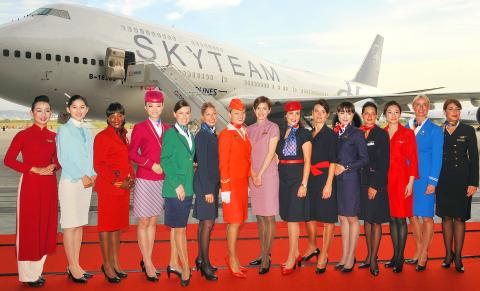China Airlines Ltd (CAL, 中華航空), the nation’s largest air carrier, expects joining the SkyTeam Alliance to contribute NT$1 billion to NT$2 billion (US$329 million to US$658 million) in company revenue by next year.
“History shows that joining the SkyTeam Alliance can benefit an air carrier’s yearly revenue by 1 percent to 7 percent, while we conservatively estimate a NT$1 billion contribution for next year, the company’s first full year in the alliance,” CAL president Sun Hung-hsiang (孫洪祥) told a media briefing yesterday.
In addition, becoming a member of SkyTeam Alliance can help an airline reduce its costs by 1 percent to 2 percent, Sun said, adding that CAL expects an initial cost-saving of between 0.5 percent and 1 percent for the next year.

Photo: Yao Chieh-hsiu, Taipei Times
The company’s remark came as it signed an agreement with SkyTeam Alliance, one of the three major global airline alliances, to become its 15th full member. CAL expects to increase its international destinations to 926, from its current 80 destinations, by joining the alliance, the company said.
CAL chairman Chang Chia-juch (張家祝) said the company also expects to join SkyTeam Cargo, a global cargo alliance, as the company faces a continued weakening of its cargo business this year.
“We are confident that the company will successfully join the cargo alliance, since we have already become a member of SkyTeam Alliance,” Chang said.
Looking ahead, Chang said the visibility for next year’s cargo market remains unclear.
“The fourth quarter used to be the traditional hot season for cargo business, but the global economic slowdown contracted the seasonal demand,” Chang said.
Chang also expects crude oil prices to stand at an “acceptable” level between US$80 to US$100 per barrel for the rest of the year and next year amid the slowing global economy.

Taiwan Semiconductor Manufacturing Co (TSMC, 台積電), the world’s biggest contract chipmaker, booked its first-ever profit from its Arizona subsidiary in the first half of this year, four years after operations began, a company financial statement showed. Wholly owned by TSMC, the Arizona unit contributed NT$4.52 billion (US$150.1 million) in net profit, compared with a loss of NT$4.34 billion a year earlier, the statement showed. The company attributed the turnaround to strong market demand and high factory utilization. The Arizona unit counts Apple Inc, Nvidia Corp and Advanced Micro Devices Inc among its major customers. The firm’s first fab in Arizona began high-volume production

VOTE OF CONFIDENCE: The Japanese company is adding Intel to an investment portfolio that includes artificial intelligence linchpins Nvidia Corp and TSMC Softbank Group Corp agreed to buy US$2 billion of Intel Corp stock, a surprise deal to shore up a struggling US name while boosting its own chip ambitions. The Japanese company, which is adding Intel to an investment portfolio that includes artificial intelligence (AI) linchpins Nvidia Corp and Taiwan Semiconductor Manufacturing Co (TSMC, 台積電), is to pay US$23 a share — a small discount to Intel’s last close. Shares of the US chipmaker, which would issue new stock to Softbank, surged more than 5 percent in after-hours trading. Softbank’s stock fell as much as 5.4 percent on Tuesday in Tokyo, its

COLLABORATION: Softbank would supply manufacturing gear to the factory, and a joint venture would make AI data center equipment, Young Liu said Hon Hai Precision Industry Co (鴻海精密) would operate a US factory owned by Softbank Group Corp, setting up what is in the running to be the first manufacturing site in the Japanese company’s US$500 billion Stargate venture with OpenAI and Oracle Corp. Softbank is acquiring Hon Hai’s electric-vehicle plant in Ohio, but the Taiwanese company would continue to run the complex after turning it into an artificial intelligence (AI) server production plant, Hon Hai chairman Young Liu (劉揚偉) said yesterday. Softbank would supply manufacturing gear to the factory, and a joint venture between the two companies would make AI data

DOLLAR SIGNS: The central bank rejected claims that the NT dollar had appreciated 10 percentage points more than the yen or the won against the greenback The New Taiwan dollar yesterday fell for a sixth day to its weakest level in three months, driven by equity-related outflows and reactions to an economics official’s exchange rate remarks. The NT dollar slid NT$0.197, or 0.65 percent, to close at NT$30.505 per US dollar, central bank data showed. The local currency has depreciated 1.97 percent so far this month, ranking as the weakest performer among Asian currencies. Dealers attributed the retreat to foreign investors wiring capital gains and dividends abroad after taking profit in local shares. They also pointed to reports that Washington might consider taking equity stakes in chipmakers, including Taiwan Semiconductor